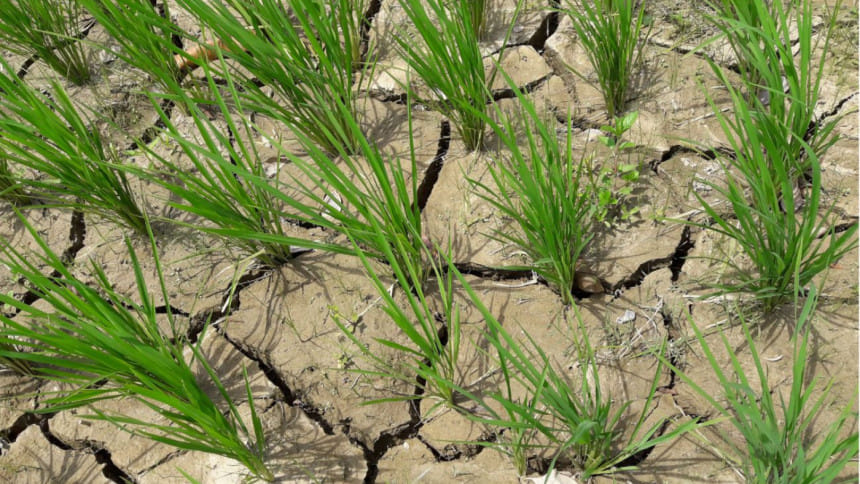Scant rain hampers aman farming

Aman farmers of Thakurgaon and Panchagarh are struggling to save their recently planted aman plants from damage due to insufficient rain during the ongoing monsoon.
During a recent visit, this correspondent saw that cracks have developed on T-aman paddy fields in different areas of the two districts. Many solvent farmers are providing irrigation in their lands by shallow or deep pump machines, but marginal farmers and sharecroppers cannot afford to do it.
The season lasts during the Bangla months of Ashar and Shraban, and the yield declines if paddy seedlings are transplanted after this period.
According to the Department of Agriculture Extension (DAE) in the district, August this year saw only 170 mm of rainfall, whereas minimum 300 mm-400 mm monthly rainfall is necessary during the time for proper aman farming. In August 2015, the district witnessed only 140 mm of rainfall.
Iddris Ali, 48, a farmer of Farabari under Thakurgaon Sadar upazila, said cracks developed in his field about 6/7 days ago due to lack of rainfall. It was tough to provide irrigation as he destroyed the temporary canals he had built for Irri-boro season. If he wanted to provide irrigation now, he would have to use polythene pipe to bring the water, which would be very costly
Arun Barman, 35, of Boikanthapur village under Thakurgaon Sadar, who irrigated his aman field with shallow pumps, said there was no alternative way to provide irrigation to save aman plants from drying out due to due to scanty rainfall.
He said farmers usually get more profit from aman paddy than Irri-boro as they irrigate it with rainwater. This season, it is uncertain if they can make profit from aman as they have to provide irrigation by shallow pumps.
This year, DAE targeted aman cultivation on 1 lakh 33,535 hectares of land with production target of 3 lakh 66,177 tonnes of rice, while about 1 lakh 33,455 hectares of land have been cultivated in Thakurgaon till Thursday.
In Panchagarh, farmers have transplanted aman on about 96,415 hectares of land while the DAE set a target to cultivate 94,500 hectares with production target of 2 lakh 59,000 tonnes of rice.
Deputy Director of DAE, Arshed Ali, said, "Rainfall is needed soon for saving aman plants. They are advised to provide irrigation where cracks have developed in the fields."
About 13,000 deep tube wells of Barind Multipurpose Development Authority are in operation to provide irrigation, he added.

 For all latest news, follow The Daily Star's Google News channel.
For all latest news, follow The Daily Star's Google News channel. 



Comments